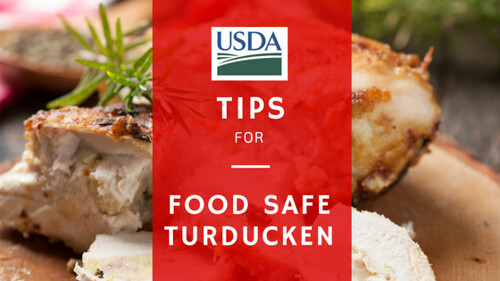
Turducken. The name doesn’t sound appetizing, but once you cut into the triple layers of chicken, duck and turkey, you can see why people bypass the traditional Thanksgiving turkey for this all-in-one, mega-stuffed delicacy.
The Turducken was born in Louisiana when someone decided to debone a chicken, put it inside of a deboned duck that is then placed inside of a deboned turkey. The end result is a boneless triple threat of poultry. Whew! Traditional turduckens have a layer of stuffing like cornbread or sausage between each section of poultry, but that’s an option for those who want the stuffing on the side.
So how do you make one of these behemoths? Can you purchase one at the store? Are they safe to eat? Well, slow down poultry lover, we have all of those answers for you.
Don’t Let Your Turducken Turn Fowl
When making a turducken, begin deboning the three birds, making sure to keep the raw poultry and their juices away from other foods. There is no need to wash the poultry before deboning. Washing will only contaminate multiple surfaces and other utensils in your kitchen.
If making a turducken with stuffing, make the stuffing first, but keep the wet and dry ingredients separate until you are ready to assemble. Begin deboning the three birds, making sure to keep the raw poultry and their juices away from other foods. After deboning, mix your wet and dry stuffing ingredients together and immediately start assembling the turducken by laying the turkey down first and coating with a layer of stuffing. The duck is next, followed by a layer of stuffing and then the chicken, which is also followed by more stuffing. Be sure to pack the stuffing loosely to promote efficient heat transfer during cooking.
Do not assemble the turducken in advance and put it in the refrigerator to cook later. The turducken must be cooked immediately to avoid the spread of bacteria throughout the stuffing. Cook the assembled bird at 325ºF until the innermost parts of the poultry and stuffing are cooked to 165ºF as measured by a food thermometer.
Frozen is Cool Too
If deboning three birds extends beyond your culinary experience, another option is to purchase an already-prepared turducken at your local grocery store. They generally come frozen and there is no need to thaw them. Follow the package directions, or if there aren’t any directions, cook from the frozen state in an oven set to 325ºF.
All of This Sounds Good, But is it Safe?
Yes, preparing and eating turducken is safe, if you follow safe food handling techniques.
- If purchasing fresh birds, store them in the refrigerator no longer than two days before assembling and cooking.
- Avoid cross-contamination by wrapping raw poultry securely in the refrigerator or using a casserole dish to avoid raw juices getting on prepared food.
- Use a food thermometer to ensure all layers of the turducken and stuffing reach a safe minimum internal temperature of 165ºF.
- Slice and serve within two hours after cooking. If it is not intended to be served with in two hours, then slice and cut in smaller portions before putting in the refrigerator to quickly cool.
- Use leftovers within three to four days after cooking or freeze for longer storage.
Have questions about turduckens? For this or other Thanksgiving meal inquiries, call the USDA Meat and Poultry Hotline at 1-888-MPHotline (1-888-674-6854) to talk to a food safety expert. You can also chat live at AskKaren.gov, available from 10 a.m. to 6 p.m. ET, Monday through Friday, in English and Spanish. If you need help on Thanksgiving Day, the Meat and Poultry Hotline is available from 8 a.m. to 2 p.m. ET.



